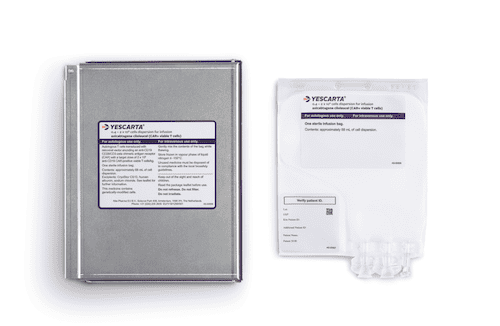
Gilead company Kite has unveiled positive results for its CAR-T therapy Yescarta in the second-line setting for relapsed or refractory large B-cell lymphoma (LBCL).
The top-line results come from the phase 3 ZUMA-7 trial, which is investigating Yescarta (axicabtagene ciloleucel) compared to standard of care (SOC) in second-line LBCL.
In relapsed or refractory LBCL, SOC includes the reintroduction of an immunochemotherapy followed by high-dose chemotherapy plus stem cell transplant if the patient responds and can tolerate further treatment.
After a median follow-up of two years, Yescarta showed a 60.2% improvement in event-free survival (EFS) compared to SOC. EFS was defined in the study as the time from randomisation to disease progression, the start of a new lymphoma therapy or death from any cause.
The trial also met the secondary endpoint of objective response rate (ORR), with investigators also noting that overall survival showed a trend favouring Yescarta at the time of the interim analysis.
“Yescarta has been instrumental in transforming outcomes for patients with third-line LBCL. Our goal has always been to bring the benefit of CAR T-cell therapy to more patients, earlier in their treatment, where the potential for benefit may be even greater,” said Christi Shaw, chief executive officer of Kite.
“As the leader in cell therapy, Kite is honoured to deliver this landmark study and would like to thank the patients, families, physicians and care teams around the world that made this possible,” she added.
The positive second-line LBCL Yescarta results follow recently reported data showing success for Bristol Myers Squibb’s (BMS) rival CAR-T therapy Breyanzi in the same patient population and setting.
The ongoing TRANSFORM study is evaluating Breyanzi (lisocabtagene maraleucel) compared to current standard of care regimens for LBCL, including high-dose chemotherapy (HDCT) and haematopoietic stem cell transplant (HSCT).
Top-line results from a pre-specified interim analysis showed that the study met its primary endpoint, with Breyanzi demonstrating a ‘highly’ statistically significant improvement in event-free survival compared to standard of care.
The CAR-T therapy also met key secondary endpoints of complete response rate and progression-free survival compared to standard of care, BMS said in a statement.
Both Yescarta and Breyanzi target CD19, a protein which is highly expressed on the surface of B cells and which remains there following the transformation of these cells from normal to malignant.
In the US, Breyanzi is cleared for the treatment adult patients with relapsed or refractory LBCL after two or more lines of systemic therapy, including diffuse large B-cell lymphoma.
Yescarta is also indicated in the third- or later-line LBCL setting and for the treatment of adult patients with relapsed or refractory follicular lymphoma (FL) after two or more lines of therapy.




